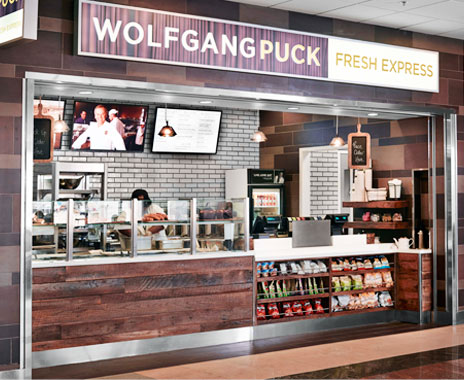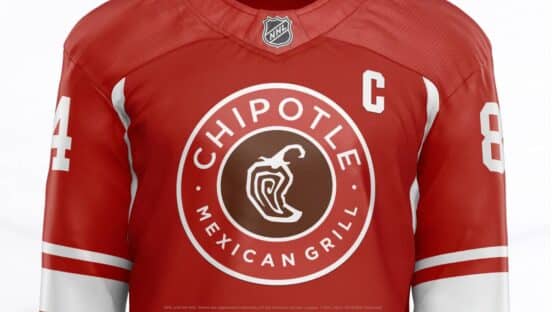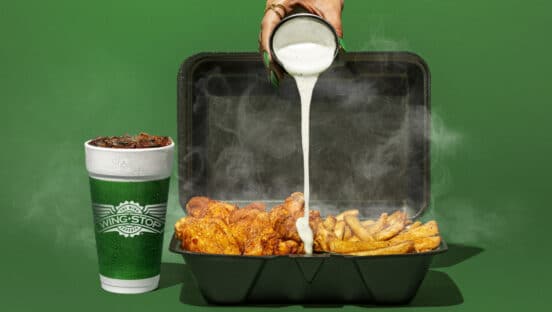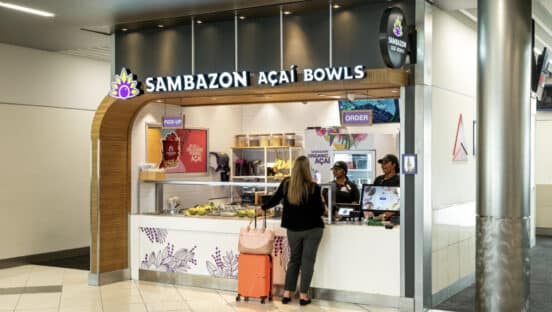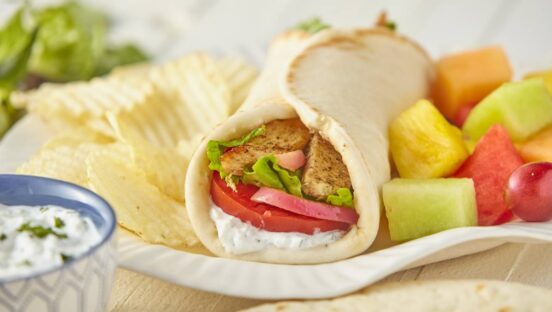When Wolfgang Puck opened his first Wolfgang Puck Express in San Francisco’s Union Square Macy’s in 1991, the James Beard Award–winning chef redefined what guests could expect from a quick, takeout meal. Now, with the rollout of three new fast-casual concepts, Puck, who many consider a fast-casual pioneer—and the first high-profile chef to dip his toes into limited service—is poised to again change how those on the go eat.
Up first is Wolfgang Puck Fresh Express, a limited-service concept whose flagship store debuted in Atlanta’s Hartsfield-Jackson Terminal D this past June. It offers a lighter version of Wolfgang Puck Express’s signature menu, with a focus on prepared-to-order soups, salads, and sandwiches. Average ticket price is $10–$15. Additional locations are scheduled to open in terminals inside Cancun International Airport, Calgary International Airport, and Dubai International Airport in 2015’s first quarter.
Also slated to launch in early 2015 are a pizza version of Fresh Express and a yet-to-be-named market-style concept that will include stations featuring freshly prepared sandwiches, soups, salads, and baked goods, in addition to coffees and specialty teas. Wine will be served, and guests will be able to choose between dining in, ordering to go, or purchasing pre-made items.
All three concepts are rooted in Puck’s trademarked “WELL” (Wolfgang’s Eat, Live, Love) approach to foodservice, which holds that great food and great flavor should be accessible to all, says Joe Essa, president and managing partner of Wolfgang Puck Worldwide (WPW), the restaurant operations and licensing arm of Puck’s empire.
“[Puck] has always felt a responsibility as a culinary leader to bring quality food to all markets,” Essa says. “Our operating plan is to keep it simple: buy better ingredients and do less with them.”
Better ingredients at WPW means all natural and antibiotic-free, even within the fast-casual space. Sourcing seasonal and local goods when possible also allows WPW to better control food costs, Essa says.
It also keeps WPW’s fast-casual brands on trend. “Our R&D kitchen focuses on anticipating what consumers will want over the next five to 10 years,” Essa says. “We already know they want quality food. They want tomatoes that taste like tomatoes. They want customized even when they’re traveling.”
Catering to travelers’ changing tastes is of particular importance to WPW. Master concessionaire licensing—airport and university—is a central component to the growth plan for all three of its new fast-casual concepts. There are plans, however, to open some traditional retail locations in lifestyle centers across the country, such as Charlotte’s Phillips Place. An ideal operating model for the new concepts, Essa says, is 25 percent company-owned, 75 percent concessionaire licenses.
“We’ve been in the licensing business for more than 20 years, and we do it well,” he says.
So well that WPW is in the early stages of developing another three airport-focused concepts.
Focusing so firmly on the airport space is a smart move, says Daniel Halpern, president and CEO of Jackmont Hospitality. His company operates foodservice concessions at some of the country’s largest airports, including Hartsfield-Jackson and Los Angeles’s LAX.
“Air travel in the United States is growing,” Halpern says. “Having your concept in the right airport is great brand exposure. Tens of millions of people will see it every year. There is a tremendous amount of visibility and traffic. The airport audience, depending on which airport you’re in, is very sophisticated.”
According to Airport Council International–North America’s “2013 Airport Concessions Benchmarking Survey,” the traveling public spent $490 million on airport food and beverage purchases in 2012, with an average ticket price of $5.15 per plane trip. Those travelers are more likely to have some higher education and average a household income of $100,000-plus. In short, they are ideal fast-casual customers.
“Americans are beginning to understand that what they put in their bodies is important,” Halpern says. “They’re looking for healthier options even when they travel. They’re also looking for more nuanced options: green, sustainable, local, artisan.”
Halpern predicts the market will see an increase in chef-driven concepts like Wolfgang Puck Fresh Express in the years to come.
“There’s going to still be plenty of demand for the established national brands, but there’ll be more small, chef-driven brands, too,” he says. “It’s easier for them to adapt to changing tastes.”
Outside the fast-casual category, Puck continues to develop full-service, casual brands, such as Wolfgang Puck Wine & Pizza Bar, which will offer craft beers and artisanal wines, and his Pizza Bar concept, which has already gone international with locations in Japan.

